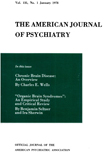An Essay on Administration
Abstract
A reasonably sophisticated knowledge of administrative theory and practice is important to psychiatrists in their clinical and educational activities. By virtue of their skills and attitudes, psychiatrists have particular administrative capacities and vulnerabilities. A useful body of administrative knowledge is readily accessible to psychiatrists and should be available to psychiatric residents. The author presents some samples of this knowledge, which includes empirically derived principles and partially tested practices. These, in turn, have generated conceptually useful theories that warrant further testing.
Access content
To read the fulltext, please use one of the options below to sign in or purchase access.- Personal login
- Institutional Login
- Sign in via OpenAthens
- Register for access
-
Please login/register if you wish to pair your device and check access availability.
Not a subscriber?
PsychiatryOnline subscription options offer access to the DSM-5 library, books, journals, CME, and patient resources. This all-in-one virtual library provides psychiatrists and mental health professionals with key resources for diagnosis, treatment, research, and professional development.
Need more help? PsychiatryOnline Customer Service may be reached by emailing [email protected] or by calling 800-368-5777 (in the U.S.) or 703-907-7322 (outside the U.S.).



